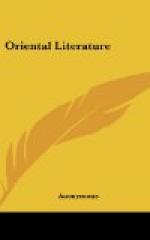With these words he ordered his slaves to bring his horses and parade them before Carwash. This was done. “Come, Carwash, look at that horse.” “He is not worth the hay you feed him on,” said the other. Then those of Hadifah were led out; among them was a mare, named Ghabra, and a stallion called Marik. “Now look at these,” said Hadifah. “They are not worth the hay they eat,” replied Carwash. Hadifah, filled with indignation at these words: “What, not even Ghabra?” “Not even Ghabra, or all the horses in the world,” repeated Carwash. “Would you like to make a bet for us with King Cais?” “Certainly,” answered Carwash—“I will wager that Dahir will beat all the horses of the tribe of Fazarah, even if he carries a hundred weight of stone on his back.” They discussed the matter for a long time, the one affirming the other denying the statements, until Hadifah closed the altercation by saying, “I hold to the wager, on condition that the winner takes from the loser as many male and female camels as he chooses.” “You are going to play me a nice trick,” said Carwash, “and for my part I tell you plainly that I won’t bet more than twenty camels; the man whose horse loses shall pay this forfeit.” The matter was arranged accordingly. They sat at table until nightfall, and then rested.
The next day Carwash left his tent at early morn, went to the tribe of Abs, to find Cais, whom he told about the wager. “You were wrong,” said Cais. “You might have made a bet with anyone excepting Hadifah, who is a man of tricks and treachery. If you have made the wager, you will have to declare it off.” Cais waited until certain persons who were with him had retired, then he at once took horse, and repaired to the tribe of Fazarah, where everybody was taking their morning meal in their tents. Cais dismounted, took off his arms, and seating himself among them began to eat with them, like a noble Arab. “Cousin,” said Hadifah to him jokingly, “What large mouthfuls you take; heaven preserve me from having an appetite like yours.” “It is true,” said Cais, “that I am dying of hunger, but by Him who abides always, and will abide forever, I came not here merely to eat your victuals. My intention is to annul the wager which was yesterday made between you and my kinsman Carwash, I beg of you to cancel this bet, for all that is uttered over cups and flagons is of no serious account, and ought to be forgotten.” “I would have you to know,” was the answer, “that I will not withdraw from the challenge, unless you forfeit the camels which are staked. If you accept this condition, I shall be perfectly indifferent to everything else. Nevertheless, if you wish it, I will seize the camels by force, or, if it be your good pleasure, I will waive every claim, save as a debt of honor.” In spite of all that Cais could say, Hadifah remained firm in his resolution, and as his brother began to deride Cais, the latter lost his temper, and with a face blazing with wrath he asked of Hadifah, “What stake




